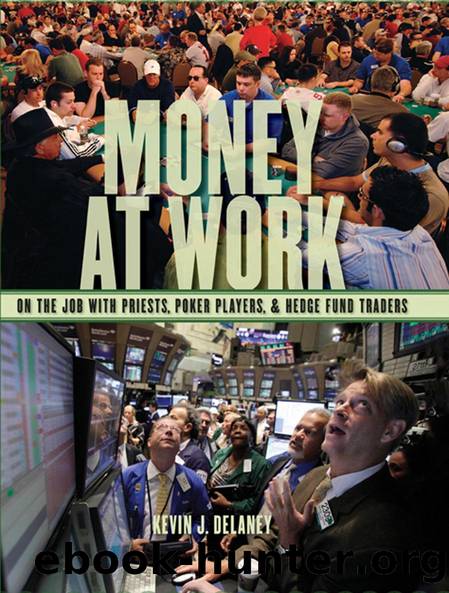Money at Work by Kevin J. Delaney

Author:Kevin J. Delaney [Delaney, Kevin J.]
Language: eng
Format: epub
ISBN: 9780814720806
Barnesnoble:
Publisher: New York University Press
Published: 2012-07-16T00:00:00+00:00
Foundational Assumptions
Clergy across many faiths have a distinct starting point for conceiving of money: that money belongs to God. As such, money represents qualitative meaning even more than it represents a quantitative measure of universal exchange value. Clergy, therefore, operate within larger belief systems that challenge commonly held assumptions, conceptions, understandings, and practices in modern finance and consumer culture. Those belief systems, of course, differ somewhat from one religious system to the next and also sometimes differ within religious systems.12 Of course, clergy must also stand with one foot in each world.
It is not surprising that clergy derive their conceptions of money, at least in part, from sacred texts (such as the biblical quotations noted earlier) and their own interpretation of those texts, as well as from a long line of tradition and practice in their own religious order. The particular doctrinal belief system within which clergy operate has an impact on how they think about money and finance. However, it is also true that even within a belief system or faith tradition, clergy have some room for interpreting beliefs about finance in differing ways. I found that the clergy I interviewed took quite a variety of approaches to financial issues, emanating from their understanding of their belief systems, sacred texts, and traditions. I do not mean to imply that clergy can simply think anything they wish to about money. I did find crucially important commonalities in the issues that most clergy were wrestling with in one form or another, and I found that clergy were quite distinctive in the way they thought about money when compared to others I studied. For example, all the clergy I interviewed talked at length about one overriding theme in relation to money and finance: How do clergy manage the role of faithfully representing their understanding of sacred texts and beliefs while also operating in a world that has moved quite a distance from those beliefs?
As a result of clergyâs distinct foundational assumption that money belongs to God, they share some unique cognitive dilemmas that are quite different from the dilemmas faced by other people portrayed in this book. For example, one of the first things you notice when you talk with clergy about money is that the topic of mortality frequently arises in conversation. Clergy of all faiths brought up the issue of death by pointing out that every person will die one day and that money is an earthly item that will not be of any value in the eyes of a deity or in an afterlife. This leads many clergy to emphasize the point that âmoney aloneâ is meaningless; it is the uses to which money is put that fundamentally matters. Clergy, like some financial advisors but in sharp contrast to most hedge fund traders and day traders, adopt a very long time frame when talking about money.13 Clergy talk about money and its role in a personâs entire lifetime and about how the way people used Godâs money during their lifetime might affect their afterlife.
Download
This site does not store any files on its server. We only index and link to content provided by other sites. Please contact the content providers to delete copyright contents if any and email us, we'll remove relevant links or contents immediately.
| Biographies | Company Profiles |
| Economic History |
Pale Blue Dot by Carl Sagan(3997)
The Rules Do Not Apply by Ariel Levy(3899)
Goodbye Paradise(2950)
Delivering Happiness by Tony Hsieh(2919)
Liar's Poker by Michael Lewis(2806)
Into Thin Air by Jon Krakauer(2695)
Purple Cow by Seth Godin(2695)
Ogilvy on Advertising by David Ogilvy(2678)
Rogue Trader by Leeson Nick(2469)
The Airbnb Story by Leigh Gallagher(2364)
The Social Psychology of Inequality by Unknown(2305)
The Mind Map Book by Tony Buzan(2075)
Six Billion Shoppers by Porter Erisman(1996)
Bossypants by Tina Fey(1984)
Claridge's: The Cookbook by Nail Martyn & Erickson Meredith(1959)
All the President's Men by Carl Bernstein & Bob Woodward(1956)
Master of the Game by Sidney Sheldon(1877)
Alibaba by Duncan Clark(1752)
Wild Ride by Adam Lashinsky(1655)
